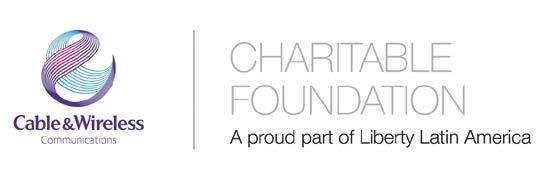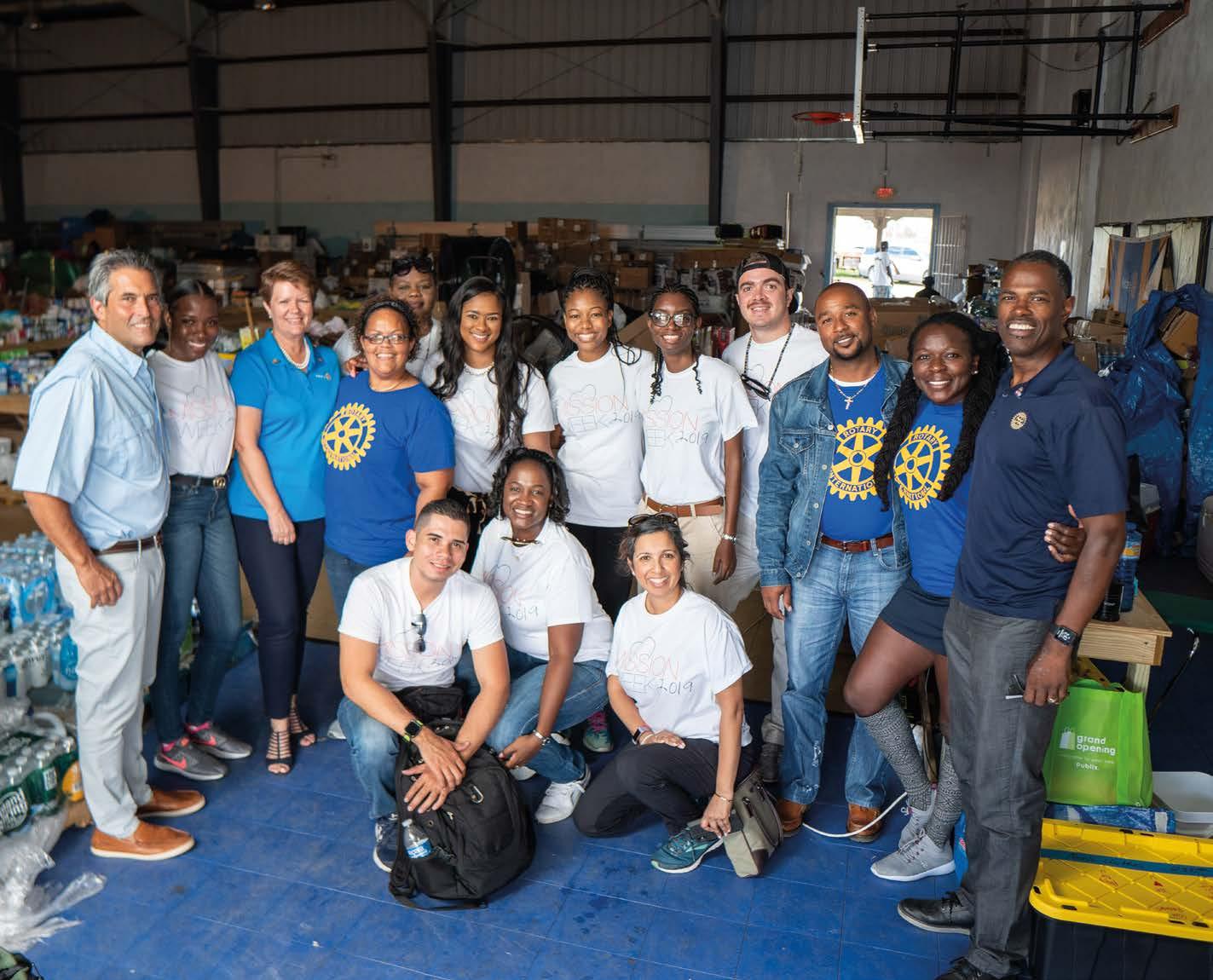
9 minute read
Cable & Wireless Charitable Foundation
What is the Cable & Wireless Charitable Foundation, and why was it created?
Ruchi: We launched the Cable & Wireless Charitable Foundation (CWCF) in 2017 as part of our commitment to doing business in a responsible and sustainable way. Today, it’s a powerful platform, helping to enable progress and build more resilient communities across the Caribbean and Latin America region. Since its launch, the Foundation has donated millions of dollars to help local, regional, and international agencies deliver relief and recovery projects across our region.
Advertisement
We created the CWCF due to the crisis we faced as a result of Hurricanes Irma and Maria, as well as the threat of other seasonal hurricanes. As a large telecommunications provider across the Caribbean and Latin America, we have an important community responsibility, and the hurricanes made it necessary for us to rethink the way we respond to humanitarian emergencies. We launched the CWCF with initial funding from our Company of US$500K to provide hurricane and eventually other relief.
The Foundation raised funds from partners, customers, and employees to provide support to local, regional, and international agencies as they execute relief and recovery projects across the region. Most recently, we have been providing direct relief to communities in need.
We respond with urgency and sensitivity in times of disaster. While over the medium-term, we help build more resilient communities by providing funding, technology, and upskilling to enable progress and build local economies. The result is that people are better able to cope with future adversity.
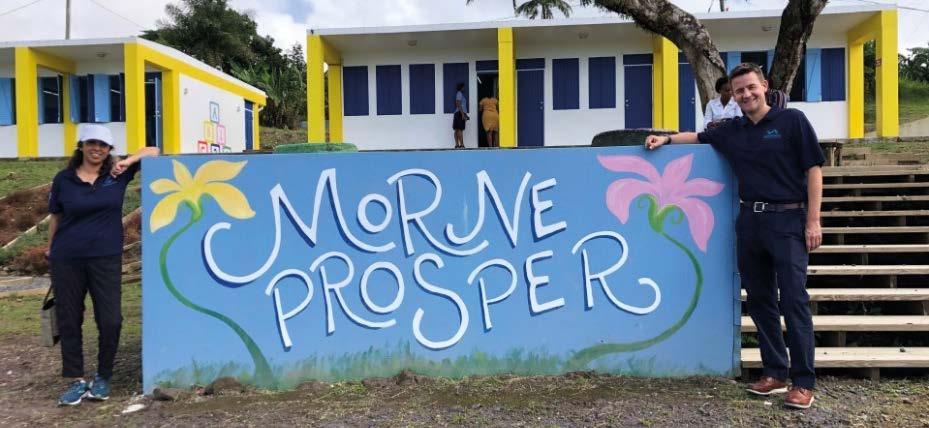
• Primary and secondary students in Dominica, Anguilla, the British Virgin Islands (BVI) and the Turks and Caicos Islands (TCI) are learning in stronger, safer facilities due to grants totaling US$650,000.
• Emergency supplies distributed to thousands in the
BVI, TCI, Dominica, Antigua and Barbuda, and Puerto Rico via a US$100,000 donation to Shelterbox.
• The people of Dominica are closer to getting their only public library rebuilt as a result of a
US$200,000 grant.
• Thousands of young people in vulnerable communities are learning new skills via a US$70,000 donation to Puerto Rico (US$25,000 to PR4PR),
Curacao (US$25,000 to Curacao Cares), and Jamaica (US$20,000 to the Flow Foundation for the
Duhaney Park Primary School).
• We granted US$100,000 to Walkers Institute for
Regenerative Research, Education and Design (WIRRED), a Barbados-based NGO focused on enhancing ecosystems to help communities adapt and be resilient in the face of climate change.
• We supported the recovery of the Bahamas after
Hurricane Dorian, by donating US$485,000 in direct relief to get emergency supplies, including food, water and generators to hospitals, doctors and shelters.
• To support the thousands of students displaced by
Hurricane Dorian, we gave a grant of US$100,000 to One on One Educational Services to roll out a virtual education program in the Bahamas. • We also donated US$50,000 to the Disaster Committee of the Rotary Club of Grand Bahama to help repair homes across the island and to get supplies to those most in need post Hurricane Dorian.
• We granted US$25,000 to World Central Kitchen to provide hot meals to thousands who were displaced by Hurricane Dorian.
• Most recently, due to the COVID-19 pandemic, we provided free access to on-line education to students in the Caribbean through a US$83,500 grant to One on One Educational Services.
• The Flow Foundation was provided with a
US$400,000 grant to fund a pilot program that supports digital education and entrepreneurship across Jamaica.
• We are currently supporting the relief and recovery efforts across Central America in light of the devastating impact of Hurricanes Eta and Iota, including a US$10,000 grant to World Central Kitchen to provide hot meals to those in need in Central
America as well as US$30,000 in direct relief to those communities impacted in Panama.
These projects are helping communities and nations to not only recover from crises but also to support them in becoming more resilient and enable economic progress.
How do you coordinate your charitable support across Central America and the Caribbean?
Noelle: Cable and Wireless Communications is one of the leading telecommunications and entertainment providers in the Caribbean and Latin America. We have a large cohort of staff and strong company culture of philanthropy. As a result of this we are often able to provide direct relief, whereby the Foundation purchases supplies, and our local teams spearhead allocation and distribution. Internally, we also host an annual Mission Week which supports staff participation in local charitable activities.
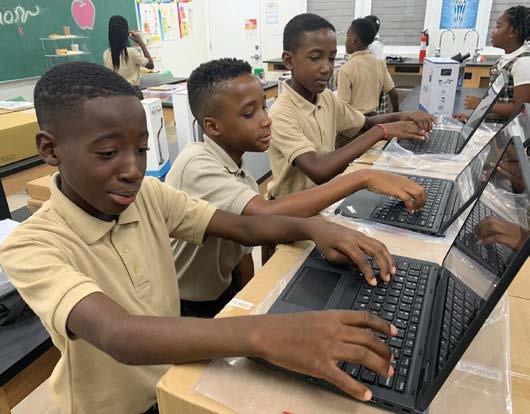
Additionally, we have developed a reliable network of corporate partners and non-profit organizations including Rotary International, the United Way, Virgin Unite, and World Central Kitchen. In keeping with the company’s philosophy of enabling progress and building more resilient communities, the Foundation provides the financial support to empower these organizations to execute initiatives on the ground. Potential grantees apply for funding through a comprehensive grant application process, which ensures that we are compliant with IRS requirements for a US based 501(c)(3) charitable organization. Requests are also assessed based on their alignment with our Corporate Social Responsibility pillars and the needs of the communities we serve. The organization will continue to develop a network of global partners who have a vested interest in the Caribbean and Latin America to ensure progress in the region.
Could you tell us about your support for relief and recovery efforts following the devastating impact of Hurricanes Eta and Iota, including your recent donation to the World Central Kitchen (WCK)?
Ruchi: Last month we allocated US$55,000, through various grants, to provide supplies, food, and other essential items for the communities of Guatemala, Honduras, and Panama which have been recently impacted by the devastating Category 4 Hurricanes Eta and Iota. As a part of this allocation, the Foundation made a US$10,000 grant to World Central Kitchen (WCK) to assist with the provision of food for the preparation and distribution of 10,000 daily lunches and dinners to families in Central America who have been affected by the devastation caused by the hurricanes. Our relationship with World Central Kitchen was established in 2019, to support relief efforts in the Bahamas following Hurricane Dorian. Chef Jose Andres and his team are reliable and tactical and are able to mobilize and be on the ground supporting communities immediately. Our employees had the opportunity to volunteer with them in the Bahamas and seeing them navigate the challenges has played a major role in our decision to continue supporting their amazing efforts.
How is the Foundation working to encourage progress and digital literacy in response to the ongoing Covid-19 pandemic?
Noelle: Learning and Access are two of the pillars on which our business operates to enable progress in the region. When COVID-19 hit, children across our region had to rely on virtual education to complete their academic year. Our donation to One on One Educational Services earlier this year provided access to free online education to students across the Caribbean regardless of who their network operator was. Students had access to more than 500 video lessons, digital courses for the K–8 curriculum, a question bank and solutions with over 40,000 exam-style questions and solutions for 35 subjects, past paper solutions for over 17 subjects, a digital encyclopedia with over 9,500 digital animations, and simulations for four subject areas and virtual science labs, with more than 500 digital laboratory simulations for science subjects and skills gap testing for over 30 subjects. The program increased from 11,000 to 37,938 users aged 5-10 since March 2020.

Our donation to the Flow Foundation in Jamaica supported the recent launch of its new National Development Program to drive digital inclusion across the country. The program is focused on supporting Jamaica’s recovery and rebuilding efforts, with an emphasis on digital education and supporting micro-, small-, and medium-sized enterprises (MSMEs) - helping everyday Jamaicans and budding entrepreneurs transition to the digital space. The digital education component is focused on digital literacy, increasing school and community connectivity, and providing certified online training for professionals. This support for MSMEs is focused on a JumpStart program for entrepreneurs, support for micro entrepreneurs and the small cottage industry at the community level, and supporting a virtual entrepreneurship expo.
What role does environmental sustainability play in the Foundation’s work?
Ruchi: Environmental sustainability is another key pillar of our business as this region is more adversely impacted by climate change. In Barbados we partnered with the Walkers Institute for Regenerative Research Education and Design (WIRRED), which is a local non-profit organization that focuses on improving communities and the natural environment by supporting a range of ecosystem services. The Foundation provided WIRRED with a grant to support their goal of planting 285,000 trees in Barbados. The initiative was dubbed ‘One Tree for Every Bajan’, as the goal represented the population on the island. The partnership also allowed WIRRED to leverage our communications assets to help create a sense of urgency around the need to protect and rehabilitate the island’s natural resources.
In Trinidad and Tobago, we have also partnered with United Way to support rebuilding activities after the devastating floods in 2018 that specifically benefit vulnerable groups as well as a longer-term awareness program to mitigate the impact of natural hazards such as floods. Communities and families affected by disasters need our continued support beyond the
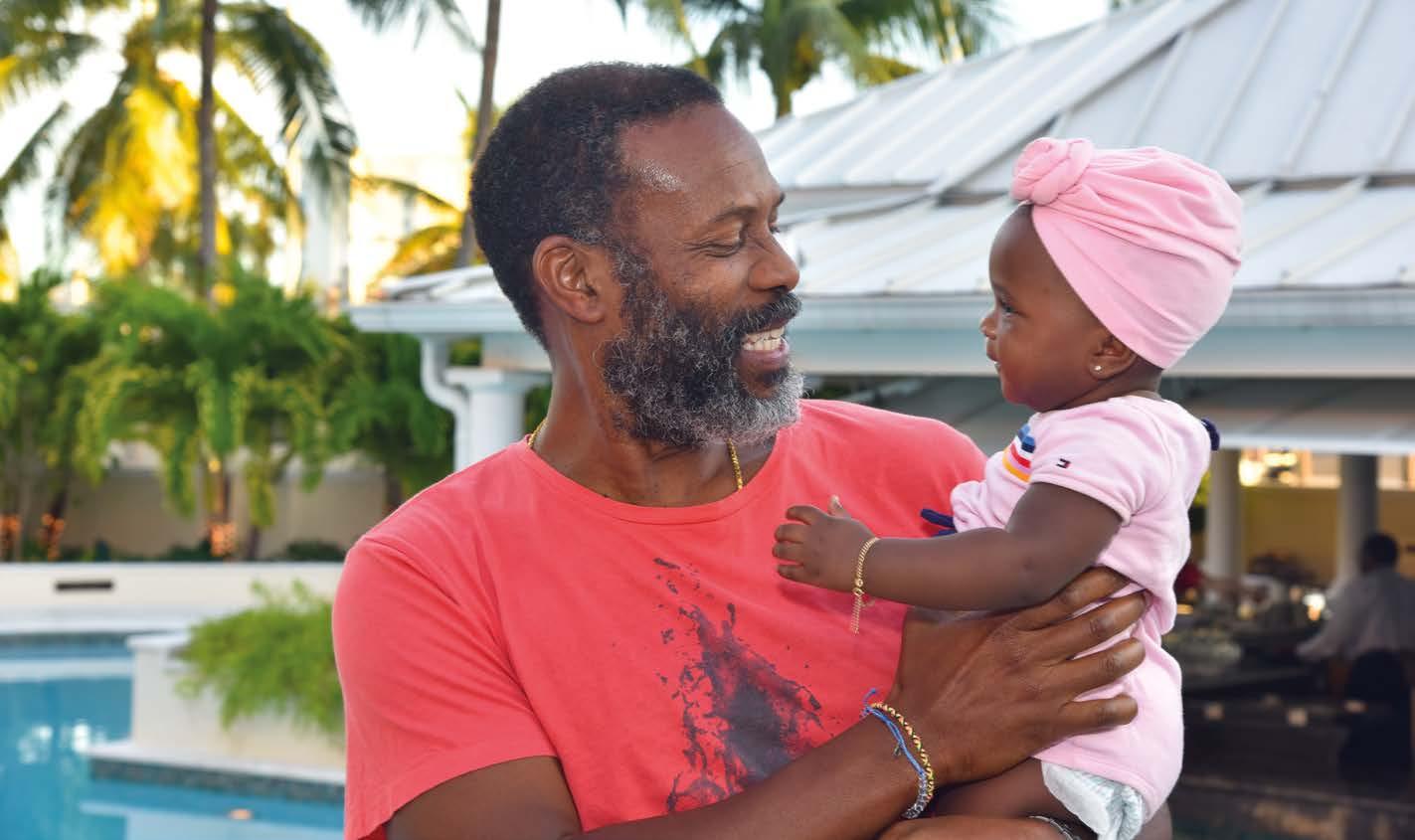
Garry Sinclair, VP, North Caribbean, Cable & Wireless Communications, supporting families affected by Hurricane Dorian in Grand Bahama 2019.
This is also an area that our staff are extremely passionate about and support through local beach cleanups, tree planting and the creation of community gardens during our annual Mission Week activities and throughout the year.
This year Liberty Latin America, our holding company, launched an Environmental, Social, and Governance (ESG) program focused on how our operations impact the environment, how we reduce the need for onetime use materials, and how we otherwise ensure that we meet our commitments and responsibilities to all of our stakeholders. We plan on publishing our first ESG annual report this year, and we have adopted the Sustainability Accounting Standards Board (SASB) framework to measure progress. communities with digital access, and those without, and has brought the negative long-term impact into the spotlight. First and foremost, we will focus on raising awareness of the issues and rallying together with our partners to facilitate solutions in order to connect communities and transform lives.
Through the Flow Foundation in Jamaica and our partnerships in that market, we have developed a pilot program which if successful will be used as a framework for serving the Caribbean and Central America. This will prioritize initiatives that focus on digital literacy training across all age-groups, online platforms to support entrepreneurship, and providing connectivity in schools and underserved communities.
Like most charitable organizations, our ability to raise the funds needed to support our mission has been negatively impacted by COVID-19. Our plan is to develop a fundraising model that enables us to continue serving the community through future crises. c To learn more about the Cable & Wireless Charitable Foundation, visit www.CWC.com
What are the Foundation’s plans for the future? Noelle: The focus is to continue supporting communities where CWC operates. We have always been in the business of connectivity, but COVID-19 has created challenges which highlight the disparity between
